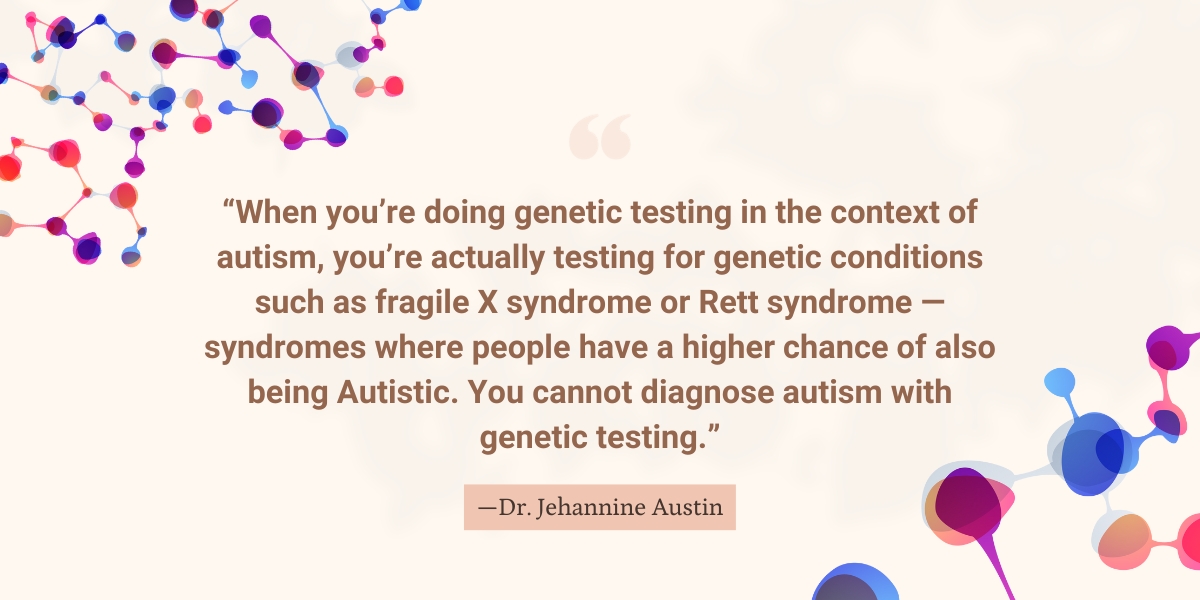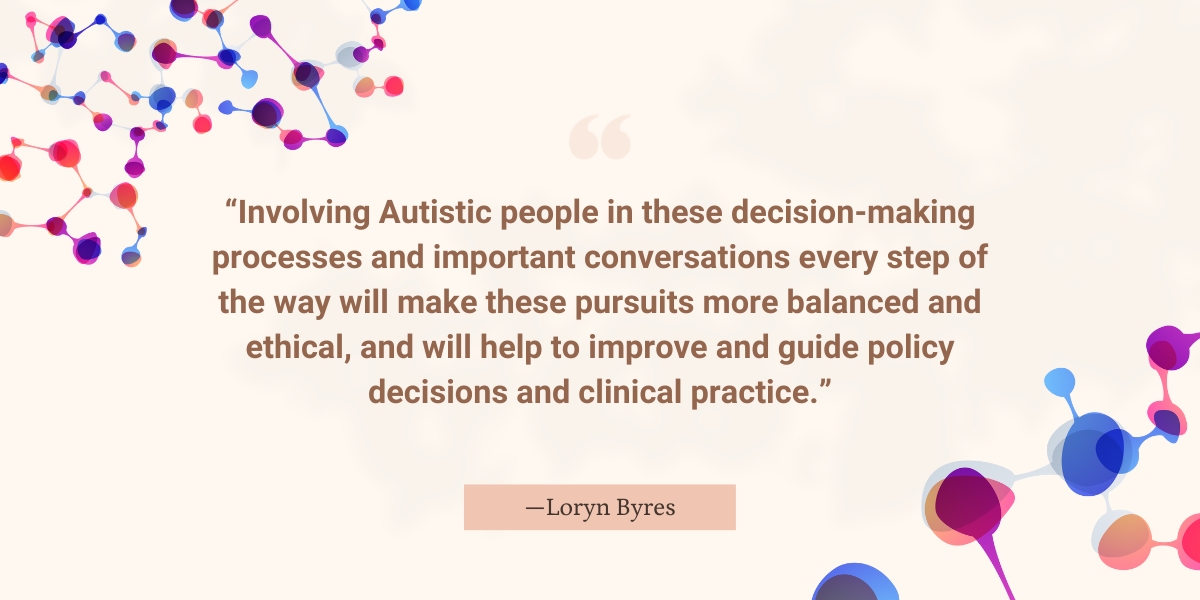For the first time, Autistic individuals have been asked to share with researchers what they think and feel about genetic testing in the context of autism. Previous research has instead focused on the thoughts, feelings, and opinions of Autistic individuals’ parents, caregivers, and health-care providers.
BCCHR’s Ask an Expert Series
We asked experts at BC Children’s Hospital Research Institute (BCCHR) and the University of British Columbia (UBC) about Autistic individuals’ perceptions of the benefits and harms of genetic testing in the context of autism.
Autism is a neurodevelopmental condition or neurotype characterized by differences in social behaviours, communication, and cognitive function. Autism is also considered to be a genetic condition, with heritability as high as 90 per cent. When people think of Autistic individuals, one of two extremes usually comes to mind: either “quirky savants” or those who are severely disabled. In reality, most Autistic individuals are somewhere in between.
We spoke with Dr. J9 (Jehannine) Austin and Loryn Byres, two of the authors of “Exploring Autistic Adults’ Perspectives on Genetic Testing for Autism,” published in Genetics in Medicine earlier this year. Dr. Austin is a researcher at BCCHR and the BC Mental Health and Substance Use Services Research Institute. Dr. Austin is also a professor in the Department of Medical Genetics and the Department of Psychiatry at UBC’s Faculty of Medicine. Byres is a certified genetic counsellor and the research coordinator of The Rare Disease Discovery Hub at BCCHR.

How is genetic testing used in the context of autism?
LB: When it comes to explaining the proposed purposes of genetic testing for autism, it really depends who you ask. Sometimes families are looking for a genetic explanation for their child’s condition. Guilt and self-blame are common for parents in these circumstances, so having that explanation — knowing that the origin of their child’s condition is genetic and not caused by some environmental or external factor — can be a huge relief for them.
Then there are health-care providers who might order genetic testing to see if a child’s autism diagnosis is associated with co-occurring conditions that may have serious health implications. In these scenarios, results of genetic testing may help predict outcomes and proactively manage these conditions.
JA: And psychiatrists and physicians often think that in order to be a good clinician, you need to understand as much as you possibly can about your patient’s condition. So they order genetic testing.
Loryn spoke about reasons for parents wanting genetic testing in the context of autism, and I’ll add the issue of family planning. The term “family planning” can be used euphemistically, when what we mean is seeking ways — via genetic testing — to avoid having Autistic children. Of course, this is devastating for Autistic individuals to hear.
LB: Absolutely. And outside of clinical uses for genetic testing in the context of autism, genetic testing is also used in autism-related research. Some individuals participate in this research as a way to contribute to science and medical knowledge, while researchers have all sorts of study-specific reasons for using genetic information in the context of autism. These applications may increase as more autism-related gene variants are discovered.
JA: In sum, the reasons for doing genetic testing in this population are incredibly varied, but these reasons are poorly articulated and understood between the various groups that have an interest in it. For these reasons, our team is working to develop a tool to help guide genetic testing conversations in the context of autism. It’s a massive and complicated undertaking, but one that we feel is incredibly important.

Is genetic testing used to diagnose autism in children, adolescents, or adults?
LB: Autism is currently diagnosed based on developmental history and behavioural criteria, for all age groups. Assessors and health-care providers use diagnostic tools such as the Autism Diagnostic Observation Schedule (ADOS) and the Childhood Autism Rating Scale (CARS).
JA: When you’re doing genetic testing in the context of autism, you’re actually testing for genetic conditions such as fragile X syndrome or Rett syndrome — syndromes where people have a higher chance of also being Autistic. You cannot diagnose autism with genetic testing.
LB: I’ll add that genetic testing can only identify causative genetic variants related to syndromes, such as fragile X and Rett syndrome, in up to a quarter of Autistic individuals. Individuals with these syndromic forms of autism usually experience higher diagnostic yield with genetic testing than those with non-syndromic autism, or what we call isolated autism. Diagnostic yield refers to the detection rate or number of individuals that can be positively detected for a condition by using a diagnostic test.
What inspired the development of your study?
LB: To answer this, I’ll need to give a bit of background: Once in my genetic counselling training program, after having worked in a neurodevelopmental research lab, I found myself in clinical settings where people talked a lot about autism and genetics. I quickly became aware of a disconnect between the different groups in the autism space. For example, some researchers and Autistic people could not agree when it came to topics such as language used to talk about autism and worthwhile goals of autism-related research. I think this disconnect really influenced my eventual research focus.
When it came time for me to choose a topic to research for my genetic counselling program requirements, I looked through some of the major medical journals to see if anything caught my eye. The first paper I read was about the perspectives of parents on genetic testing for autism. I thought to myself, “This is useful, but there must also be a paper on Autistic individuals’ perspectives out there somewhere.”
So I went digging for that and never found it. In fact, in the process of looking for Autistic perspectives, I found around 20 additional papers on parents’ perspectives and a couple papers about clinicians’ perspectives. This seemed like a major oversight, so I had my subject! Jehannine was very helpful in figuring out how to make it happen.
JA: Very kind of you to say. Loryn had a brilliant sense of how we could get it done right from the beginning.
What challenges did you experience in developing the study?
LB: In developing the survey, I really had a hard time deciding whether to use person-first language or identity-first language — in other words, “person with autism” or “Autistic person,” respectively. Most of the research literature uses person-first language and they even tell you in university classes to use person-first language. But I was hearing the exact opposite from the Autistic community.
The compromise we came up with involved developing two different versions of our online survey. This meant that as soon as a person consented to participate, they could choose their preferred language — person with autism or Autistic person. Then the entire survey would be formatted according to their preference. Ninety-three per cent of our study participants chose the identity-first language version!

What were the main findings of your study?
LB: We found that the majority of Autistic individuals, nearly 75 per cent, thought that genetic testing should only be offered if the Autistic individual is able to consent. And about half, nearly 50 per cent, said they didn’t think genetic testing for autism should be done at all. This is in contrast to what we’re seeing from parents of Autistic children, who mostly support genetic testing. And it’s also in conflict with some of the policies we have regarding when genetic testing for autism should be offered.
A lot of the time, the decision to conduct genetic testing is made by other people who have the Autistic child’s best interests in mind, but they don’t realize the ways the decision might undermine the Autistic individual’s autonomy. We have to really think about the benefits to the child whenever we’re considering pediatric genetic testing.
What study results are you most excited to share?
LB: In addition to sharing that 93 per cent of our participants preferred identity-first language, I’m most excited to share the results from a separate section of questions we developed that were not covered in the survey section. While the survey section comprised multiple choice, Likert scale, and visual analog scale questions, the separate section allowed participants to write free-form responses. We ended up with 68,000 words of text! We are now doing an in-depth content analysis of this data, the results of which we intend to publish separately.
JA: In recalling our first look at what people had written in their free-form responses, many — spontaneously and without prompting — used the word “eugenics” to talk about how they saw genetic testing in the context of autism. The participants articulated really complex ideas absolutely beautifully.
LB: Yes! Participants simultaneously articulated concerns about eugenics and genetic testing prenatally for autism, while also expressing a pro-choice stance and supporting women’s right to choose.

What results surprised you the most?
LB: I was surprised by the depth of the responses and the effort participants put into writing them. It takes energy, dedication, and passion to compose these kinds of responses. It was clear that this subject was really important to them, and it showed both in their responses and in the number of participants who shared the survey on social media for others to respond. That felt really good and was very rewarding.
JA: I think you and I were surprised in opposite directions, Loryn. I was expecting the depth of responses we received because we knew that people in this community had never before been asked for their opinions and insight on genetic testing. However, I was surprised by the number of participants. I was not expecting 461 people to take part!
LB: Also, there was an entire section where participants could write about how they felt about their autism diagnosis. Words such as “relief” and “validation” came up a lot, and so many of the responses were clearly very positive. This type of positivity is not often associated with the diagnosis of autism, at least not in the medical literature.
JA: Yes, that was one of the sections that gave me goosebumps, where people talked so movingly about what their autism diagnosis meant to them.
I’m the vice president of the International Society for Psychiatric Genetics. In that community, all of the language and rhetoric is around “risk for autism” and other negative framing of autism. There’s a real juxtaposition between this risk-based verbiage that people use, that paints autism diagnosis as some sort of tragedy, versus what we’re actually hearing from Autistic individuals: “Hallelujah, this is who I am! This explains my experiences and there’s no tragedy here!” We’re really hoping that people listen and start to understand this.
LB: Agreed. I really hope that our results and future published results help improve and increase the dialogue surrounding genetic testing in the context of autism. We’d like to see health-care providers and research communities take a long, hard look at what they’re doing and how they’re approaching autism research, autism genetic testing, and Autistic patients and their families.
Involving Autistic people in these decision-making processes and important conversations every step of the way will make these pursuits more balanced and ethical, and will help to guide policy decisions and improve clinical practice.




